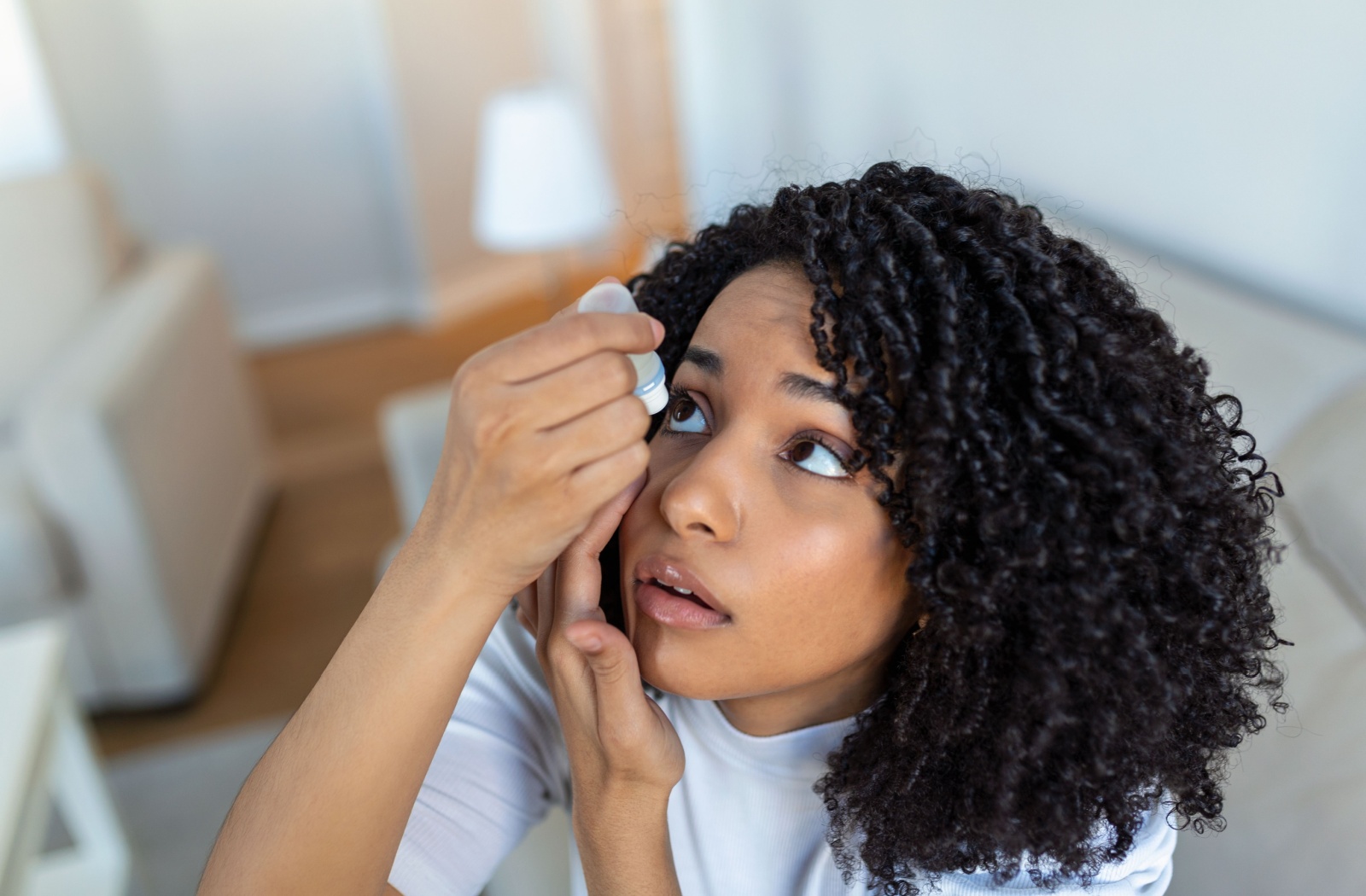Dry eyes can be more than just an uncomfortable inconvenience. They can be painful and distracting, impacting your overall quality of life. But what do they have to do with floaters? These are tiny specks and strands that drift across your vision, and some people assume that dry eyes cause them.
While floaters and dry eyes can occur simultaneously, dry eyes do not cause floaters. However, floaters can be a symptom of other eye conditions, and dry eyes are plenty frustrating on their own. In either case, your optometrist is well-suited to help you find relief!
What Are Dry Eyes?
Dry eye is a common condition that affects millions of Americans every year. It occurs when your eyes don’t produce enough tears or when the tears evaporate too quickly. This can happen for various reasons, including:
- Age: Tear production tends to decrease as you age
- Hormonal changes: Pregnancy, menopause, and birth control pills can affect tear production
- Environmental factors: Wind, smoke, and dry air can cause tears to evaporate more quickly
- Medications: Antihistamines, decongestants, and antidepressants can reduce tear production
- Medical conditions: Conditions like rheumatoid arthritis, diabetes, and thyroid disorders can contribute to dry eyes
Of the 2 types of dry eye, evaporative dry eye is much more common. It’s typically caused by meibomian gland dysfunction (MGD), occurring in over 85% of cases. The meibomian glands line your eyelids and secrete an oil that keeps the tear’s surface smooth and prevents it from evaporating too fast.
When these glands become inflamed or blocked, your tears will disappear before they can hydrate your eyes. Before you know it, you’re living with dry eye symptoms, such as:
- Stinging or burning sensation
- Scratchiness or feeling like something is in your eye
- Sensitivity to light
- Redness
- Blurred vision
- Difficulty wearing contact lenses
The Link Between Dry Eyes & Floaters
Eye floaters are small, shadowy shapes that drift across your field of vision. They can look like spots, threads, or cobwebs and are usually more noticeable when looking at a plain background, like a white wall or a clear sky.
Eye floaters are caused by tiny clumps of gel or cells inside the vitreous, the clear, jelly-like substance that fills the inside of your eye. These clumps cast shadows on the retina, the light-sensitive layer at the back of your eye, which is what you see as floaters.
There is no direct link between dry eyes and floaters. Dry eyes primarily affect the front surface of the eye and tear production, while floaters originate from natural changes within the vitreous body inside the eye. However, both conditions can cause discomfort and affect your vision.
While they’re separate conditions that can have different causes and symptoms, it’s essential to manage both for overall eye health. Most people experience floaters and they typically come and go—no treatment required. However, if the floaters appear suddenly, in great numbers, or don’t go away, ensure you tell your eye doctor.
Causes of Floaters
Dry eye may not cause floaters, but they can have similar risk factors. Some more serious conditions that can cause floaters include:
- Vitreous detachment
- Retinal tears or detachments
- Inflammation
- Eye Injuries
- Eye infections
- Bleed within the eye

Managing Dry Eyes to Reduce Discomfort
While managing dry eyes won’t eliminate floaters, it can significantly improve your comfort and overall eye health. Here are some strategies to help reduce your risk of dry eyes:
- Stay hydrated: Drink plenty of water to keep your body and eyes hydrated.
- Use a humidifier: Adding moisture to the air can help prevent tear evaporation.
- Take breaks from screens: Regular breaks from computer screens can reduce eye strain and dryness.
- Wear sunglasses: Protect your eyes from wind and sun exposure by wearing sunglasses outdoors.
If lifestyle changes aren’t providing sufficient relief, consulting an eye doctor is a crucial step in managing dry eyes. Your doctor can conduct a comprehensive eye exam to determine the underlying cause of your dry eyes and provide tailored treatment options. These focus on restoring moisture and improving tear production/retention. Treatments may include:
- Artificial Tears: Over-the-counter lubricating drops can provide relief for mild dry eyes
- Prescription medications: Your doctor may prescribe oral tablets, medicated eye drops, or ointments to reduce inflammation or stimulate tear production
- Punctal plugs: These tiny devices can be inserted into the tear ducts to prevent tears from draining away too quickly
- Warm Compresses & Lid Massages: Applying a warm compress to your eyes can help unblock oil glands and increase tear production. Gently massaging your eyelids during or after the compress can further enhance this effect.
We’re Here for All Your Eye Care Need
While dry eyes do not cause floaters, they can still impact your vision and quality of life. If you experience persistent dry eyes or notice new floaters that don’t go away, contact Envision Eye Care. Our friendly team is ready to assess your symptoms through a thorough evaluation and develop a personalized treatment plan.
Don’t wait to take control of your eye health. Book an eye exam with Envision Eye Care today!



